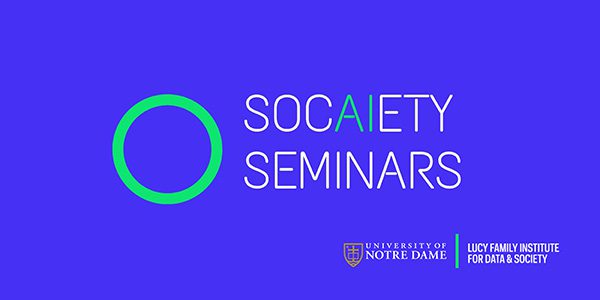Consider This! Simplifying the COVID-19 conversation – Vaccines and the Immunology of COVID-19
Subscribe to the ThinkND podcast on Apple, Spotify, or Google.
Featured Speakers:
- Heidi Beidinger-Burnett, Director, Eck Institute for Global Health Masters Program; Associate Professor of the Practice, Department of Biological Sciences, University of Notre Dame; President of the St. Joseph County Board of Health
- Mary Ann McDowell, PhD, Associate Professor of Biological Sciences and Member of the Eck Institute for Global Health, University of Notre Dame
- Brian Baker, Rev. John A. Zahm Professor and Department Chair, Department of Chemistry and Biochemistry, University of Notre Dame
- Jeffery Schorey, George B. Craig Jr. Professor, Department of Biological Sciences, University of Notre Dame
In this event, hosts Heidi Beidinger-Burnett, PhD, Director, Eck Institute for Global Health and Mary Ann McDowell, Associate Professor of Biological Sciences, were joined by guests Brian Baker, Rev. John A. Zahm Professor and Department Chair, Department of Chemistry and Biochemistry and Jeffery Schorey, George B. Craig Jr. Professor, Department of Biological Sciences. The group was brought together to discuss vaccines and immunology against Covid-19. Brian Baker is a professor of biological sciences and researches molecular recognition in the immune system, specifically T cells, which can be described as the “memory cells” of the immune system. Jeff Schorey is a professor of chemistry and biochemistry and his research focuses on infectious diseases and tuberculosis.
The event began with Beidinger discussing the current state of coronavirus in the county. She explained that cases were still on the rise in St. Joseph County, and discussed the importance of wearing masks. Then, she introduced the guests who talked a bit about their respective research. Schorey shared that he studies tuberculosis, and that 1.5 million people die of the disease every year. His goal is to figure out how the disease invades the body and how the immune system responds in order to combat the disease. They are currently trying to develop a vaccine for TB, which is not very different compared to the fight to develop a vaccine for Coronavirus. Baker then discussed his study of T cells and how they relate to Covid. How does the immune system tell the difference between the person to which it belongs and an invader of that system? This also relates to his work in cancer immunology/cancer therapy.
Next, the group discussed new EUA (Emergency Use Authorization) rules on vaccines. Typical vaccines go through several years of research and trials, while this one did not. Schorey said that experts are pushing the timeline of the vaccine so much because it is the hardest people have worked on something in human history. He also made note that if the government did not think it would be successful, they would not financially support the next step. They then talked about the meaning of peer review in the creation of these vaccines. This process entails the following: when one scientist finalizes the creation, other scientists anonymously and rigorously critique the work.
A discussion about “immunity” after infection with Covid-19 followed, with the scientists stating that it is believed that there is immunity after infection, but it is too soon to tell definitively how long that immunity would last. However, it is promising that with past SARS viruses, people were immune for as long as eighteen years later. This led to the question of the definition of immune responses as well as the difference between sterile and protective immunity. An immune response is defined as one in which the immune system eliminates foreign components. There are different types of immune responses: sterile and protective. Schorey explained that sterile immunity is not usually given with a vaccine. Sterile immunity means that the virus never infects the person. With protective immunity, the pathogen may infect someone but the person is protected against strong replication of that virus and therefore protected against sickness.
Baker and Schorey also shed light on the idea that everyone’s immune system is different, and will respond to the virus differently as well as build immunity differently. It is also difficult to know whether natural immunity or vaccine immunity will last longer, as it is too early to discover the answer.
The scientists then moved on to discuss the audience’s questions. One notable question was “How does someone measure the relative effectiveness of different vaccines, and would someone be more protected by combining vaccines?” Schorey answered that the effectiveness is measured in trials by the immune response to the vaccine. The first two trials determine how safe the vaccine is in the human, and the third determines efficacy. Then, Schorey and Baker both stated that they would feel comfortable participating in a clinical trial, as the vaccines undergo much research before they reach that point.
- 8:52—Guests were introduced to the event. Brian Baker is a professor of biological sciences and researches molecular recognition in the immune system, specifically T cells, which can be described as the “memory cells” of the immune system. Jeff Schorey is a professor of chemistry and biochemistry and his research focuses on infectious diseases and tuberculosis.
- 15:49—The pandemic has changed people’s views on taking normal vaccines, such as flu vaccines, and the FDA putting new guidelines out for vaccines.
- 25:00—While the new vaccine is being created at a very fast pace, efficacy is not being compromised.
- 31:21—There are different types of immunity and the immunity that the vaccines will grant is protective immunity, meaning that he pathogen may infect someone but the person is protected against strong replication of that virus and therefore protected against sickness.
- 58:50—Schorey and Baker both stated that they would feel comfortable participating in a clinical trial, as the vaccines undergo much research before they reach that point.
- “All the mechanisms that are out there to push these vaccines are there without sacrificing the efficacy and safety of the vaccines.” – (Jeff Schorey 24:33)
- “Immunity is the process through which immune cells eliminate foreign materials.” (Jeff Schorey 29:00)
- “You want the vaccine to protect you from disease, not infection.” (Jeff Schorey, 33:52)
- “One of the important things to keep in mind is that everyone’s immune system is different.” (Brian Baker 35:56)
- “Dysregulation of the immune response can be very deadly, and there is something about the SARS virus that, in come cases, leads to a very dysregulated immune response. (Brian Baker, 57:45)
Related Content
Climate Change and The Limits of Narrative
Join the Kellogg Institute for the introductory session of a workshop refining Kellogg Faculty Fellow Roy Scranton’s draft book project “Ethical Pessimism: Climate Change and...
View EventReunion 2024
Alumni Education Programming Click each program title to learn more. To return to the Reunion 2024 website on my.nd.edu please click here. ND Perspectives: Election 2024 and the...
Read ArticleA Brave New World of AI Governance
Explore the connection between data, geopolitics and governance, regulation, self-regulation while discovering examples of good and bad practices in various sectors, such as...
View Event


